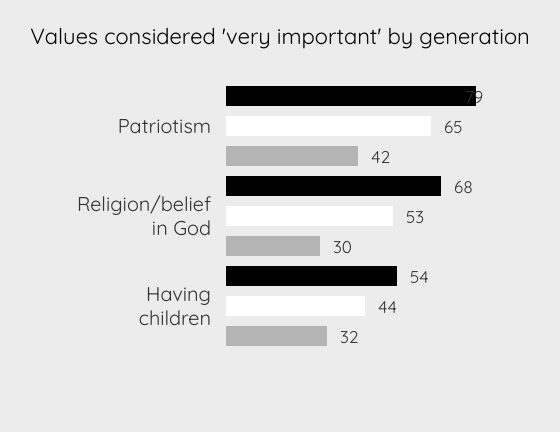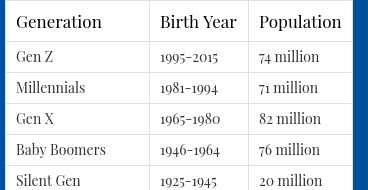Teens’ values are shifting
 Rutger Hoekstra, a junior, considers patriotism, having children and religion as “very important” values. These views actually put Hoekstra in the minority among his generation.
Rutger Hoekstra, a junior, considers patriotism, having children and religion as “very important” values. These views actually put Hoekstra in the minority among his generation.
According to an August 2019 poll by The Wall Street Journal, young generations consider values like those much less important than older generations do.
Views varied sharply by age. Nearly 4 out of 5 people (79%) who were 55 or older said patriotism was very important, compared with 2 of 5 people (42%) aged 18 to 38; two-thirds of people (65%) aged 39 to 54 said patriotism was very important.
Two-thirds of the older group recognized religion as very important, compared with fewer than one-third of the younger group.
While it is obvious that Americans are currently more politically divided than they have been in decades, many people would not anticipate that what used to define America is now becoming insignificant.
“I am both surprised and saddened to see such fundamental American values being ignored by many across our nation,” said junior Nate Sundeen after he saw the poll.
So then what is causing younger people to dissent from the ideology held by their parents and grandparents?
One possibility could be that Millennials and members of Generation Z, who are significantly more progressive than any other age group, associate patriotism and God with conservative ideals. Even though those ideals once crossed party boundaries, many progressives eventually overlooked them because of their traditional nature.
When the United States was founded, not only did the country have a Christian aspect, but church attendance and religious involvement was far higher. Now, even though a smaller portion of America is religiously involved, society has still indisputably advanced morally since the time of the Founding Fathers.
David Hoffner, executive director of faith formation and AP Economics teacher, believes it’s a possibility that church attendance has declined because society no longer expects people to attend, not because of less care for the
 values that define Christianity and other religions.
values that define Christianity and other religions.
“There’s no social pressure to do it, so they don’t, and before there might’ve been slight expectation or pressure to do it, so they did. But they were probably never that fervent,” said Hoffner.
If this is true, the decline in true religious worshippers has not declined much; it’s just that fewer people attend religious services because of the status it gives them or the social pressure on them.
Andrew Root, professor at Luther Seminary and author of The Pastor in a Secular Age (Baker, 2019), thinks churches and other religious organizations can appear constraining to teens and young adults.
“I think some young people perceive that what religious communities do is tell young people how to live their lives,” said Root.
There are few explanations for why children are less of a priority for Gen X and Millennials, but a strong case is the growing uncertainty about the future of the country and environment. They may not want children growing up surrounded by the current events, or they may not want to have to redirect their focus to raising children.
Root believes one factor could be that younger people nowadays value their independence to such an extent that they don’t want to risk sacrificing it for children.
“The dream of living a good life used to include having children in it, and now it doesn’t,” said Root.
He also thinks that because people are going to school for longer and getting full-time jobs later than previous generations, they are delaying having children.
“People are having a harder time entering into a lot of the economic structures that a few generations ago they could’ve,” said Root.
Additionally, another recent study found that birth rates, not just sentiments towards having children, are falling in the US. The data show that the birth rate is the lowest it has been in 32 years, according to the National Center for Health Statistics at the US Centers for Disease Control and Prevention.
Regardless of the causes of devaluation in religion, family and patriotism, the fact remains that all three have strongly united people for centuries. If this trend continues, the country could lose several key sources of unity, which could have unknown consequences.
Hoffner believes that Americans will not benefit from individualism without being members of communities.
“If you don’t replace these things with other communal practices, America could look like a really lonely place,” said Hoffner.

